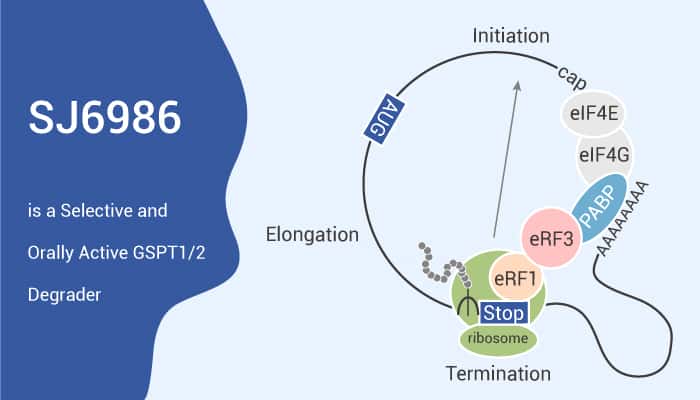Targeted protein degradation (TPD) is a novel chemical biology approach. Molecular glues (MGs) are small molecules that can bind to E3 ligase and change their surface and specificity, leading to the recruitment, ubiquitination, and subsequent degradation of substrates that are normally not targeted by the ligase (neosubstrates). Immunomodulatory imide drugs (IMiD), thalidomide and its analogs, are the “original” molecular glues. Importantly, the modification of the IMiD scaffold will affect the efficiency and kinetics of neosubstrate degradation. These chemical modifications lead to considerable changes in cellular responses, creating new opportunities for clinical transformation.
SJ6986, a Thalidomide analogue, is a selective and orally active G1 to S phase transition 1 (GSPT1) and GSPT2 degrader. SJ6986 displays selectivity over ~9000 proteins, including the classical IMiD (immunomodulatory imide drug) neosubstrates such as IKZF1. In addition, SJ6986 shows antiproliferative activities in a CRBN-dependent manner in the two leukemia cell lines, MV4-11 and MHH-CALL-4 cells. Furthermore, in MV4-11 cells, SJ6986 decreases the GSPT1 and GSPT2 protein abundance in a dose-dependent manner. Zoran Rankovic et al also proves that SJ6986 effectively depletes GSPT1, thereby inducing cell apoptosis earlier. And this compound does not induce IKZF1-CRBN/DDB1 ternary complex formation.

In pharmacokinetic studies, SJ6986 is stable in mouse and human liver microsomes with low intrinsic clearance, and high plasma protein binding rate. Similarly, a single oral dose of 6 at 10 mg/kg gave peak plasma concentrations at 0.25 h, suggesting rapid absorption, and the oral bioavailability is 84%.
In summary, SJ6986 is a selective and orally active GSPT1/GSPT2 degrader, which supports the utility of a diverse library of CRBN binders in the pursuit of targeting undruggable oncoproteins.
References:
[1] Gisele Nishiguchi, et al. J Med Chem. 2021 Jun 10;64(11):7296-7311.